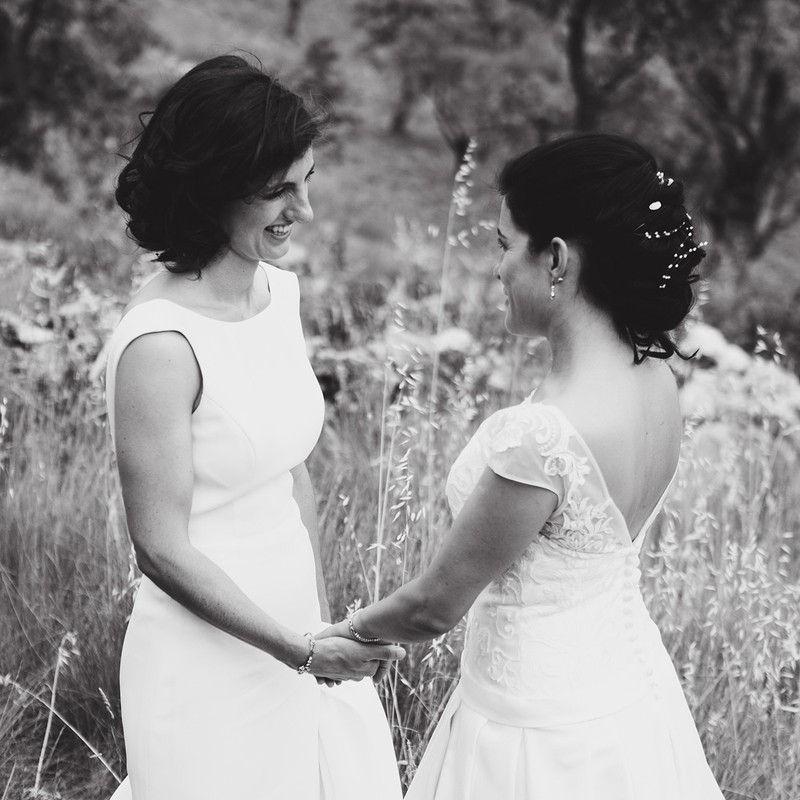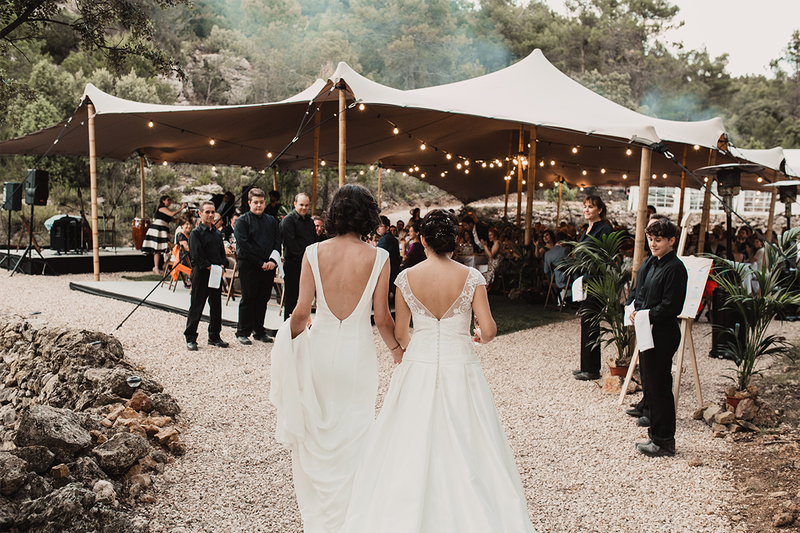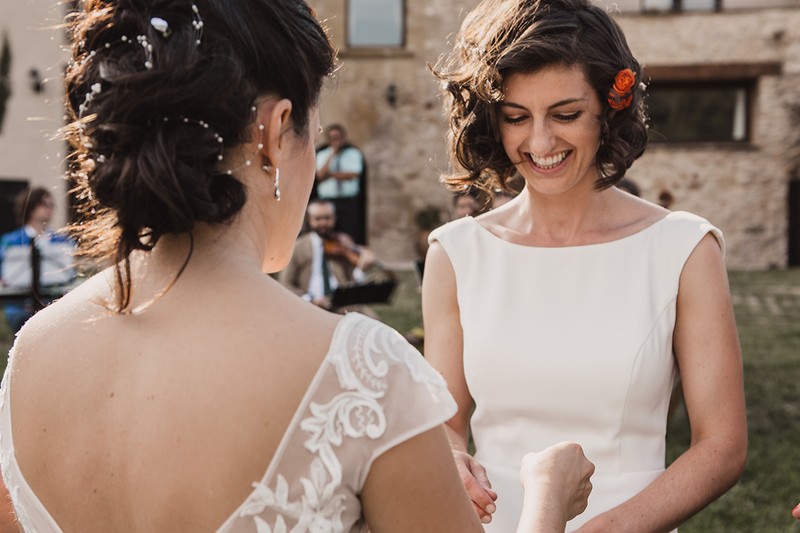
What Pride Month Means To This Inspirational Woman
I didn’t realise I was gay until I was 26. To some people, that might sound old, but it took a long time to dawn on me. That’s despite being raised in a western, open society, with little experience of extreme homophobia. If I’m honest, it never felt like I was denying anything – I just didn’t know. At the time, the idea of what a gay woman looked like was limited, too – so I just didn’t identify with the stereotype.
There were times when I came close to articulating my feelings. But I never confronted it. Looking back, I realise I was always reading the problem pages in magazines – specifically the letters from people who were worried about being gay. But the answer from the ‘expert’ was always “You’re a teenager with too many hormones and it’s probably a phase.” It ultimately made me assume the same thing about myself.
Growing up, I always had boyfriends. I also had experiences with girls but a lot of them used it as an excuse to impress guys and it didn’t mean anything to them. For me, having boyfriends and heterosexual relationships helped protect me from the crazy teenage world where everyone was expected to have a ‘natural’ interest in boys. It prevented anyone from asking questions and stopped me from confronting my feelings.
Things started to change when I moved to New York. Having struggled to meet people initially, I just assumed I wasn’t interested in American guys. Eventually, I ended up dating one guy for about a year and a bit. Then, I met up with a friend who was visiting, and she admitted to being in a relationship with a woman. She claimed it was just a one-off and that she wasn’t a lesbian – but I was the one who burst into tears. I’d often thought she might be gay and my emotional outburst came down to the fact I suspected she thought the same about me.
After that, I decided to talk to my boyfriend. He said, “Lucinda are you trying to tell me you think you might be gay?” Although I denied it at the time, it was like a lightbulb switched on in my head and I was instantly flooded with memories from my childhood. For example, I remembered being told off at primary school for kissing a girl who didn’t like it. It felt very shaming and like it had been labelled as ‘wrong’ in my mind. Shame is such an important word in our community – all anyone ever wants to be is some non-existent idea of ‘normal’ and it’s also a very female thing to want to be what people say you should be.
I never had to sleep with girls to know they were right for me. I was already doing the mental work by this point, coming to terms with my new reality – I even had a nightmare about marrying my boyfriend! The more I tugged at the thread, the more everything made sense. I even re-watched all of The L Word as some kind of therapy! It would have been so easy for me to marry a man and not really confront any of these feelings, but for the next year and half, I went out to lesbian bars in New York, London and then in Madrid. It quickly dawned on me that being gay is the greatest leveller – it doesn’t reflect any one demographic and people from all walks of life are a part of this world.


Coming out happened pretty quickly after I moved back to UK. In that time, I’d become certain of who I was and moving back in with my parents meant being completely open and honest. I had already started telling my friends, most of whom were incredibly supportive. There had been zero awkwardness or rejection – which was something I had really feared. I decided to tell my parents and brother at the same time – in hindsight, Mother’s Day probably wasn’t the ideal time to do it. Anyway, I turned to Google for help, and it told me to deliver the information how you would want it to be received i.e. be as positive and happy as possible and they’re likely to react in a similar way.
In the end, I was maybe a little too light-hearted. My parents weren’t the type to pry much into my personal life but it still came as a bit of a shock. I ended up saying that although I didn’t have a girlfriend yet, the next person I had a relationship with might be a woman. My mum looked at me like she didn’t understand, so I said, “Well, I’m gay”. Her response was: “How do you know? You don’t have a girlfriend.” I said, “I don’t need to have one to know I’m gay.”
My dad didn’t say much. I also remember my brother joking he wouldn’t mind being gay as he quite liked the idea of coming out. It was all quite surreal. I know my mum felt deceived, but really, the only person I’d lied to was myself. She said some things at the time I knew not to take to heart and, to be honest, both my parents are amazing now. Looking back, I realise my mum was probably worried about the prejudices other people might project onto me and our family.
From that point on, there was no going back. I hadn’t realised until then how limited my life had been. Thankfully, I’d already learnt quite a few relationship and ‘life’ lessons, so meeting someone was about zoning in on exactly what I wanted. I had no desire to waste time sleeping with people who just happened to share my sexuality. After six months, I moved to Madrid – a city that I knew was open-minded and gay-friendly. All in all, I’ve had a privileged experience as a gay person – I’ve had no experience with abuse and only very little with resistance. It’s also legal everywhere I’ve lived, which is not the case for everyone.
In Spain, I tried online dating. I wanted to make sure all the doors were open and to be with someone seriously. I set up a profile on Gaydar and left it there – it was only after I wrote to a few girls who didn’t write back that I realised I’d set it to private by accident! Eventually I found someone who looked approachable, and I was busy looping in a friend to help me draft a message to her when – ping! She messaged me first. I met Helena that night. We’ve been together eight years and will soon celebrate our fifth wedding anniversary.
I’d always imagined myself having children. My wife has known she was gay since she was young, and having grown up not seeing any gay families as a reference, presumed she wouldn’t have one herself. Plus, she never envisaged herself being pregnant, whereas I had. In the end, it worked out that we both shared the same vision: to have a family and for me to carry the children. Today we have a three-year-old girl and newborn boy.

IVF is so common now I’m sure my experience hasn’t been that different to anyone else’s. That said, I do think becoming a parent in a gay relationship is easier for women and gay men have it a lot harder. There’s a lot of prejudice around – how often are dads seen at a playgroup or at the school gates? Even in children’s books – if they don’t feature a mum and a dad, they at least feature a mum. It’s very rare to see any depiction of gay dads or single fathers.
In our neighbourhood, there’s another three-year-old girl with two dads. It’s great because it means other parents and their children are being exposed to different family structures, as are their teachers. That said, I’m aware that in the future there might be some hurdles for us to navigate: Father’s Day for instance. Personally, we don’t know who our children’s dad is, as our donor was anonymous, but we’re so grateful to them for helping us create a family. If we can foster a happy stable home, I’m hoping our children won’t feel an absence.
To those struggling with their sexual identity, try reading as much as you can about other people’s experiences. In New York, I went to a bookshop – although you could go online these days – and read what I thought could help me. Books with funny titles like, Your Prince Charming Is Really A Princess. If you’re able to voice your feelings to a friend first – and yes, it is terrifying – that can also help you get over the fear of rejection. If they’re really your friend, they will always love and care about you. Finally, remember you don’t have to make some big announcement – just tell the person you want to share some thoughts or feelings. There’s no one way to go about it.
There’s never going to be a perfect time to come out. The important thing is to try and show your family or your parents that you’re happy with who you are – without eliminating the gravity of what you’re saying. Even if it takes time, their response may well be positive in the end. If you present the information in a way that lets them know they don’t have to worry about you, then they’ll probably be okay with it. That said, it’s wise to prepare for some backlash or anger – just know they might be reacting instinctively and it’s not what they really think.
If you think your own child might be gay, put your own agenda aside. For starters, your child might not realise it or it might not be true. Never confront them before they’re ready to share. If, as a parent, you do find you’re struggling after they tell you they’re gay, try speaking to other parents who might have experienced the same thing. These days, there’s bound to be someone else in your extended circle who’s gone through it. Perhaps it will make you realise how evolved you are in your own thinking. Also, it’s important to recognise what a big deal it was for your child to share this with you – it’s a powerful message that they want to stop living in shame.
Until gay people don’t have to deal with shame, we’ll always need Pride. No matter how much progress we make, there are always moments of regression – homophobic abuse still exists, and it can always rise up in a vacuum, so don’t take what looks like widespread acceptance for granted. Right now, there are still so many people in this community dealing with and processing some kind of shame – Pride reminds us everything will be okay and that no one is ever alone.
For more information visit PrideInLondon.org. Those who want further help or support can contact Stonewall.org.uk, MindOut.org.uk or AKT.org.uk.
Want to learn more about Pride Month? Click here.
DISCLAIMER: We endeavour to always credit the correct original source of every image we use. If you think a credit may be incorrect, please contact us at info@sheerluxe.com.

